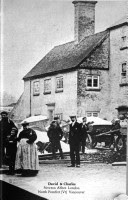I have started to read more and more book with a boating theme to them. I tend to buy a few books from Amazon from time to time. I came across these two by the same author a few weeks ago. Others boaters with an interest in the history of canals may find them of interest.
The much of the original material for this book was researched during Harry Hansen's study for a degree in the 1970's. It is a follow up to his previous book (Canal Boatmen 1760-1914). The original research examined a plethora of records including census returns, canal company papers, local government board reports and many other contemporary documents. This book shines a light onto the people and their way of life on the canals. The fresh air and healthy living lifestyle of the canal people is dispelled forever. There are many anecdotal claims made about English canal life. Many claims are unfounded and have been perpetuated again and again in other publications. This book casts doubt on the credibility of much of the anecdotal evidence. It is however a softer read with less of the dry statistical evidence of the previous book. There are some wonderful period photographs.
This book should be on every canal historians bookshelf.
ISBN-10: 0719005752 292 pages 1975.
The book was researched during Harry's study for a degree in the 1970's. It calls upon a wealth of records (including census returns, canal company papers, local government board reports and many other contemporary documents) that were then carefully analysed. This book challenges many of the anecdotal claims made about English canal life. Including research on the origins of the people, their morality, causes of violence, their economic activities, their living conditions and educational standards. Starting from 1760 and ending with the serious decline in the canals that came around prior to the first world war. There is a great deal of information available on the construction and operation of the canal infrastructure. However, this book shines a light onto the people and their way of life. In particular the book comments on the do-gooders like George Smith and casts doubt on the credibility of some of Smith's claims. It calls question to the real impact of the railways upon the canals. It also dispels forever some of the anecdotal evidence about the importance of the owner operator or "number ones" and their impact on canal trade.
This book should be on every canal historians bookshelf.
Canal People, Again the author is Harry Hansen ISBN-10: 0715375598 224 pages 1978.
The much of the original material for this book was researched during Harry Hansen's study for a degree in the 1970's. It is a follow up to his previous book (Canal Boatmen 1760-1914). The original research examined a plethora of records including census returns, canal company papers, local government board reports and many other contemporary documents. This book shines a light onto the people and their way of life on the canals. The fresh air and healthy living lifestyle of the canal people is dispelled forever. There are many anecdotal claims made about English canal life. Many claims are unfounded and have been perpetuated again and again in other publications. This book casts doubt on the credibility of much of the anecdotal evidence. It is however a softer read with less of the dry statistical evidence of the previous book. There are some wonderful period photographs.
This book should be on every canal historians bookshelf.
There are also some other books that have turned up during my search. Which, whilst intended as a serious publications have for one reason or another attracted a great deal of reviewer comment on Amazon. The comments are often quite humorous.
The book is called How To Avoid Huge Ships The author is John Trimmer.
This book will be treasured by most boaters operating on the canals and rivers. Full of hints and tips of ways of avoiding coming into conflict with large ships whilst out boating. However, for best benefit you must read the readers reviews for the book.
The Stray Shopping Carts of Eastern North America: A Guide to Field Identification. The author is Julian Montague.
This book will be treasured by most boaters operating on the canals and rivers of the UK. It will help with species identification of those shopping trolleys to be found gracing the canals, rivers, towpath and other waterside habitats. Again, for best benefit you must read the readers reviews for the book.
Is there anything that you can't buy on Amazon?
The JL421 Badonkadonk Land Cruiser is an Amazon reviewer, must read.
Later.....





Hi Mick,
ReplyDeleteHaving just read your statement "Why I Write this Blog" I thought you might find this from Blogger John Witts on WB Pippin interesting: "So why blog? Well, I suppose it boils down to this: If Facebook is a letter home, then a blog is a message in a bottle; you cast it adrift in the datastream and know not where it will be picked up, or by whom."
I look forward to following your adventures. My best to you and your crew. May your journeys be joyous,
Jaqueline
Cloudhouse
Pullman USA
Hi Jaqueline.
ReplyDeleteMessage in a bottle brings the band "Police and Sting" to mind. I will be humming it all evening now.
Its a very true statement in more ways than one. I was at sea for 11 years. I wrote around 50 messages and placed them in various bottles. I put them over the side in various oceans of the world. I have not had a single reply.
I was also active on SETI and I decoded quite a lot of data (with the SETI screensaver) on my PC at work. I never did hear from ET either.
But it was nice to hear from you. You're welcome aboard Rosie's blog anytime.
Best wishes from me and the crew.
M-M and P